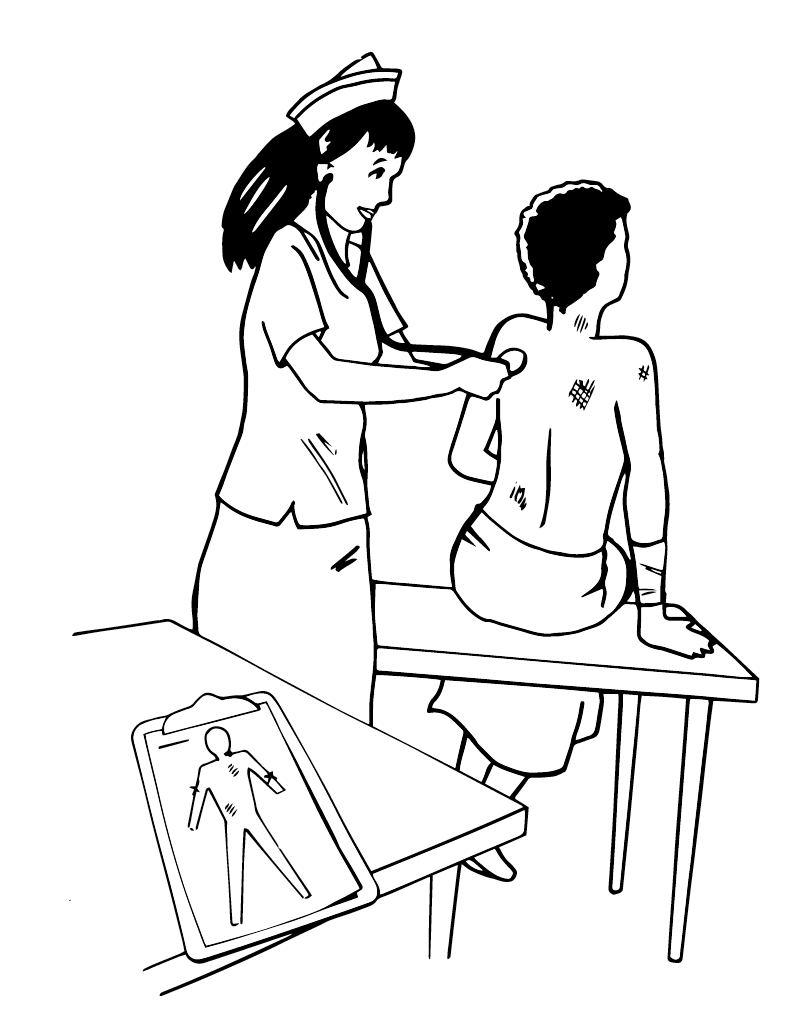Chapter 25
What Can Family Planning Providers Do?
1. Help women feel welcome, safe, and free to talk.
Help women feel comfortable to speak freely about any personal issue, including violence. Assure every woman that what she discloses will be kept confidential.
Give a woman opportunities to discuss issues that concern her—for example, her partner’s attitudes toward her use of family planning or any possible problems with using family planning—or you can ask simply if there is anything she would like to discuss. Most women will not bring up that they are being abused, but some may disclose it if asked. Be alert to symptoms, injuries, or signs that suggest violence. Violence at home may lead a woman to refuse family planning or to insist on a specific method, to resist family planning counseling, or to insist on reversal of female sterilization. Many pregnancies close together or requests for pregnancy termination may also be an indication of violence at home. (Of course, there could be many other reasons for these preferences and behaviors.)
2. If you suspect violence, ask about it.

Some tips for bringing up the topic of violence:
- To increase trust, explain why you are asking—because you want to help.
- Use language that is comfortable for you and best fits your own style.
- Do not ask such questions when a woman’s partner or anyone else is present or when privacy cannot be ensured.
To explore whether a client is experiencing partner violence and to support her disclosure of violence, you can first approach the topic indirectly. You can say, for example:
– “Many women experience problems with their husband or partner or someone else they live with.”
– “I have seen women with problems like yours who have been having trouble at home.”
You can follow it up with more direct questions, such as these:
– “Are you afraid of your husband (or partner)?”
– “Has your husband (or partner) or someone else at home ever threatened to hurt you or physically harm you in some way? If so, when has this happened?”
– “Does your husband (or partner) or someone at home bully you or insult you or try to control you?”
– “Has your husband (or partner) forced you into sex or forced you to have any sexual contact you did not want?”
To explore further how violence affects a woman’s reproductive and sexual life, you can ask these 4 questions:
– “Has your partner ever told you not to use contraception, blocked you from getting a method, or hidden or taken away your contraception?”
– “Has your partner ever tried to force you or pressure you to become pregnant?”
– “Has your partner ever refused to use a condom?”
– “Has your partner ever made you have sex without using contraception so that you would become pregnant?”
| “Should I ask all my clients about violence?” Health care providers should routinely ask all clients about violence only if they are trained in asking about violence and offering first-line support, if privacy and confidentiality can be ensured, and if referral linkages to other support services are in place. |
In response to a disclosure of violence, you should offer first-line support. First-line support provides practical care and responds to a woman’s emotional, physical, safety, and support needs, without intruding on her privacy.
First-line support is the most important care that you can provide. Even if this is all you can do, you will have greatly helped your client. First-line support involves 5 simple tasks. The letters in the word “LIVES” can remind you of these 5 tasks that protect women’s lives—Listen, Inquire about needs and concerns, Validate, Enhance safety, Support.
- First-line support is the most important care that you can provide. Even if this is all you can do, you will have greatly helped your client. First-line support involves 5 simple tasks. The letters in the word “LIVES” can remind you of these 5 tasks that protect women’s lives—Listen, Inquire about needs and concerns,Validate, Enhance safety, Support.
| LISTEN | Listen to the woman closely, with empathy, and without judging. Give her a chance to say what she wants to say in a safe and private place to a caring person who wants to help. Listening is the most important part of good communication and the basis of first-line support. If she does not want to talk about violence, assure her that you are available whenever she needs you, and that anything she discloses will be kept confidential. |
| INQUIRE ABOUT NEEDS AND CONCERNS |
Assess and respond to her various needs and concerns. As you listen to the woman’s story, pay particular attention to what she says about her needs and concerns—and what she does not say but implies with words or body language. She may let you know about physical needs, emotional needs, or economic needs, her safety concerns, or social support that she needs. Respect her ability and her right to make her own choices about her life. |
| VALIDATE |
Show her that you understand and believe her.
– “This happens to many women.” – “You are not alone, and help is available.” |
| ENHANCE SAFETY |
Discuss a plan to protect herself from further harm if violence occurs again. Explain that partner violence is not likely to stop on its own. It tends to continue and may become worse and happen more often. You can ask: – “Are you or your children in danger now?” – “Do you feel safe to go home?” – “Is there a friend or relative who can help you with the situation at home?” If the woman faces immediate danger, help her consider various courses of action. If not in immediate danger, help her make a longer-term plan. |
| SUPPORT | Support her by helping her connect to information, services, and social support. Women’s needs generally go beyond what you can provide in the clinic. You can help by discussing the woman’s needs with her, telling her about other sources of help, such as shelter, social services, child protection, police, legal aid, financial aid, peer support, and assisting her to get help if she wants it. |
4. Provide appropriate care. Tailor your care and counseling to a woman’s circumstances.
- Treat any injuries or see that she gets treatment.
- Discuss with her how she can make the best choices for family planning in her circumstances.
- If your client wants a method that would be hard for her partner to detect or to interfere with, an injectable may be her best choice. You might also discuss IUDs and implants. Be sure to point out that even these methods can sometimes be detected.
- Make clear that these methods do not protect her against STIs including HIV. Condoms are the only family planning method that protects against STIs as well as pregnancy. Give information and offer referral to support services, if available, for women’s empowerment and skills building on condom use negotiation and safer sexual practices.
- Provide emergency contraceptive pills if appropriate and wanted.
5. Document the abuse experienced by the woman.
Carefully and confidentially document the woman’s history of abuse along with symptoms or injuries and the cause of the injuries if relevant. Record the relationship of the perpetrator to the woman.
